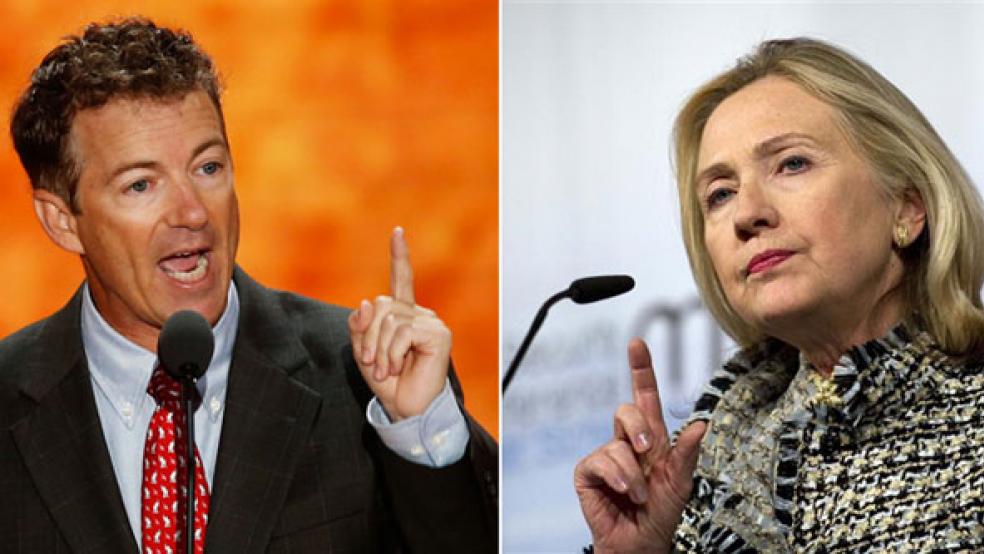President Obama’s bid for congressional support for an attack on Syria is almost certain to define the foreign policy debate for the 2016 presidential campaign – with Oval Office aspirants positioning themselves on an issue that has very little public support at the moment.
Democratic frontrunner and former Secretary of State Hillary Rodham Clinton has endorsed the president’s call for military action, while most of the Republican presidential wannabees are highly skeptical or outright opposed to an attack.
RELATED: SYRIA’S CHEMICAL WEAPONS ATTACK: KEY FACTS
GOP presidential hopefuls will have a chance to express their disapproval – should they wish to – on a joint resolution to approve bombing Syria that Obama has asked Congress to pass. The Senate Foreign Relations Committee prepares today to vote on a measure that would grant Obama limited authority to carry out air strikes against the Syrian regime over the next 60 to 90 days.
Hillary Clinton famously lost the 2008 Democratic presidential nomination to Obama in large measure because of her vote in favor of the October 2002 Iraq War Resolution. That resolution authorized then-President George W. Bush to use to military force against Saddam Hussein. Later, President-elect Obama offered Clinton the post of secretary of state as a consolation prize.
The lesson was clear that consequential foreign policy and strategic military decisions can come back to haunt candidates in hard-fought presidential contests.
Still, even after opposing direct U.S. intervention in the Syrian civil conflict during her tenure as Secretary of State, Clinton on Tuesday publicly backed Obama’s goal to win Capitol Hill approval of his call for military action against the Syrian government for its use of chemical weapons on August 21, which killed more than 1,400 civilians. Clinton said through a spokesman that “she supports the president’s efforts to enlist the Congress in pursuing a strong and targeted response to the Assad regime’s horrific use of chemical weapons,” according to The Washington Post.
Vice President Joe Biden, a potential rival for the 2016 Democratic presidential nomination, is marching in lockstep with the president in trying to build support for air strikes against Syrian President Bashar al-Assad.
THE GOP STANCE: MUCH MORE COMPLICATED
But a fresh crop of Republicans seemingly angling for the 2016 GOP nomination are staking out grounds for opposing the president, reflecting in part a growing isolationism within their party and the public’s war-weariness and disenchantment with the outcome of U.S. invasions of Iraq and Afghanistan. Here’s a summary of what the most outspoken Republicans angling for the Oval Office have to say about Obama’s call for military intervention in Syria:
Sen. Rand Paul (R-KY)
While the prominent libertarian and frequent critic of Obama said he was “proud” of the president for seeking congressional authorization before taking action, he insists “it is a mistake to get involved in the Syrian civil war.”
RELATED: RAND PAUL’S POINTED QUESTIONS FOR JOHN KERRY
Paul told John Kerry during Tuesday’s Senate Foreign Relations Committee hearing, “I think there is a reasonable argument that the world may be less stable because of this, and that it may not deter any chemical weapons attack . . . I haven’t had one person come up to me and say they are for this war. Not one person.”
On Monday, Paul tweeted, “When we fight, we fight because we have to and we fight to win. I'm not sending my son, your son or anyone else’s son to fight for stalemate.”
Sen. Ted Cruz (R-TX)
The Tea Party darling has strangely attempted to link the situation in Syria to the president’s signature health care reform law. “You look at Syria, you look at Obamacare. They’re tied together ... by an arrogance of this administration, they don't believe they’re accountable to the American people, and they are going to jam their agenda down the throats of the American people,” Cruz said.
Sen. Marco Rubio (R-FL)
The Florida freshman chided lawmakers for not cutting short their August vacation to return to D.C. to debate military action in Syria. In a statement Saturday, Rubio said, “The United States should only engage militarily when it is pursuing a clear and attainable national security goal. Military action taken simply to send a message or save face does not meet that standard.”
Rep. Paul Ryan (R-WI)
The 2012 GOP vice presidential candidate and House Budget Committee chairman said that Obama has made grave mistakes in moving toward Syrian intervention, after staying on the sidelines as more than 100,000 people were killed in the fighting between the Assad government and rebels. Without taking a stand one way or another, Ryan said he wants to hear the president make his case convincingly to Congress and the American people.
Gov. Scott Walker (WI)
The combative Wisconsin governor is viewing the international crisis through the prism of his state’s struggling economy. The Republican recently told WKOW.com, a Madison-based radio station, that Obama should put pressure on Syrian officials and work with “other leaders on a global basis” to “get things under control in the Middle East.”
Gov. Bobby Jindal (LA)
The Louisiana governor told WDSU, a New Orleans-based television station, that Obama needs to more clearly lay out the case for military action in Syria and articulate what “America’s clear national strategic interests are,” as well as what the goal in military action would be.






